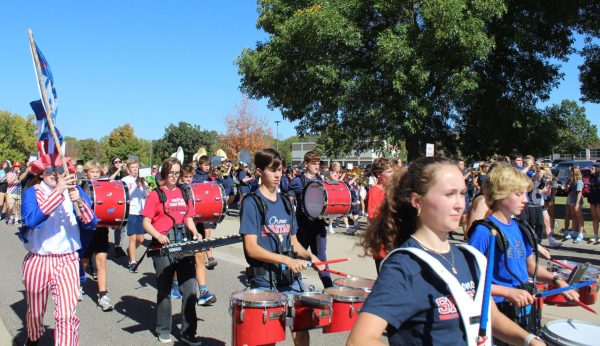Celebrate and Elevate: Black History
Collaborating with celebrated poet and activist Joe Davis, members of the Student Voice group performed song, poetry and discussion before a school assembly at Orono High School in honor of Black History Month.
“There has been a lot of energy around elevating differences and really focusing on inclusion and belonging, So this is honestly the third year that we have been able to celebrate Black history,” advisor Erin Head said.
Head said for this year’s assembly, members of Student Voice wanted to go beyond honoring the tragedies overcome by the civil rights movement. She said the goal was to place emphasis on answering what black history is and its role in everyone’s lives. The goal was to make personal connections to the students involved.
“I feel like it is a common misconception that slavery is black history,” Maria Williams, a participant of the assembly, said. “For me personally, for Black History Month, I think it’s like a collective of ideas and culture shared with the black community.”
Williams said that many people often fail to remember black history doesn’t start with slavery or end with the Jim Crow era, and that she believes there is a currently a failure to educate indivudals on the entirety of black history in the American education system.
“Even today black history is being made. We are a part of black history,” Williams said.
Student Voice members said another goal of the group is to properly educate and engage all students in black history.
“That was a focus for the next Student Voice meeting,” Head said. “How do we continue this conversation? How do we engage others in learning and understanding black history?”
That’s precisely what the assembly created. Students involved shared their personal connections to moments in black history through poetry, song, and speech, giving the audience a chance to be a part in a vulnerable and raw moment of human expression.
One of these moments in particular was when freshman Anthony McMillian sang “A Change Is Gonna Come” by Sam Cooke. Considered to be an anthem of the civil rights movement, the song is somewhat of a metaphor for human uplift, alluding to ideals of perseverance in the midst of unjust treatment, with senses of optimism prominent throughout.
It was when McMillian stood before the stage and sang the song that the room grew silent and the audience appeared to be most captivated.
In collaboration with the students in the assembly was Davis, a celebrated poet and civil rights activist. Growing up in Minot, ND, Davis said he was raised in a household which upheld creativity with an utmost respect.
“Even when I was a kid, before I knew how to write, I would run around the house making up wild stories and acting them out like a play or a movie. Poetry and storytelling have always been a part of my life,” Davis said.
Today, Davis attends high schools nationwide, presenting his poetry and helping students discover the art of the written and spoken word. This was Davis’ second year influencing the Black History Month presentation at OHS. In addition to reading aloud his pieces of poetry, he helped the group members develop the format of the assembly such as crafting engaging questions and brainstorming topic ideas.
To describe working alongside Davis, “we got to create a bond with another black individual outside of Orono and get to express ourselves in a way that we usually couldn’t do here,” Williams said.






















































